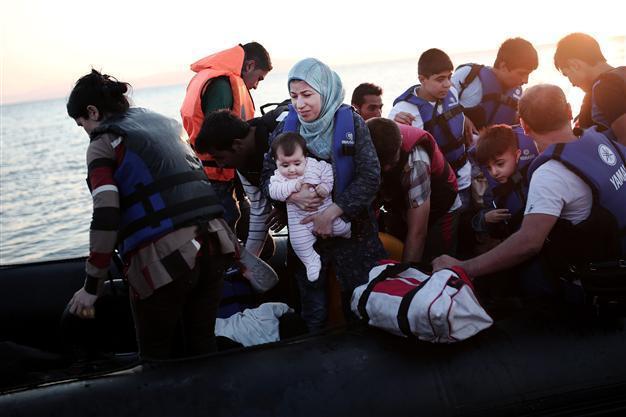Turkish crackdown on 'ghost ships' sparked migrant drive to Greece: IOM
GENEVA - Agence France-Presse

Migrants get out of an inflatable boat as they arrive on the Greek island of Kos after crossing a part of the Aegean Sea between Turkey and Greece on August 13, 2015. AFP Photo
Turkish efforts to stop traffickers from sending large "ghost ships" crammed with migrants towards Italy has sparked the surge in arrivals in Greece, the International Organization for Migration said on August 13.The migrants and refugees making the perilous journey across the Mediterranean to Europe are increasingly travelling the eastern route from Turkey to the Greek islands, which have seen more arrivals since the beginning of the year than long-time top destination Italy, according to UN figures.
IOM spokesman Joel Millman said the main explanation for the surge in numbers of people arriving in Greece was a Turkish crackdown on traffickers' attempts to acquire large metal freighters to use as migrant "ghost ships" heading to Italy.
Towards the end of last year, traffickers began buying dilapidated freighters from scrap metal yards, filling them with hundreds of mainly Syrian refugees, and putting them on a GPS course towards Italy, with no crew onboard, he told AFP.
A number of these boats made it into Italian waters, and the migrants onboard made it to Italy.
This raised expectations that it would remain a relatively safe route to Italy, which is seen as the easiest entry point to Europe, since unlike Greece it borders other countries that are part of the open-border Schengen area.
"We understand that quite a number of people, particularly Syrians, were massed in Turkey waiting to go on one of these voyages, because they were directly bound for Italy and because the boats were considered much safer and much more sea-worthy than some of the boats that had gone out of Libya," Millman said.
Traffickers in some places even bought up cheap hotels to house migrants for what they expected would be a few days, but which turned into months after Turkey effectively blocked access to the freighters.
Thousands of people who had already paid traffickers to take them to Italy were thus stuck in Turkey with no way to get to their destination and no refunds offered.
In the end, Millman said, many appeared to agree to a compromise: allowing the traffickers to get them to Greece, which is much closer and can be reached on small dinghies.
The result has been clear. Some 124,000 refugees and migrants landed on the Greek islands during the first seven months of the year -- up 750 percent from 2014, according to UN figures.
But Millman said the spike in Greek arrivals did not mean that fewer people were travelling the central Mediterranean route from civil war-ravaged Libya to Italy.
He said about 102,000 people had taken that route so far this year -- comparable to 2014, when 170,000 made the trip during the entire year.
"We don't see any let up," he said, adding though that there was a clear shift in the nationalities attempting that route.
People fleeing from Syria's savage civil war were clearly opting to leave through Turkey, with the number of Syrian departures from Libya down from around 40,000 in 2014 to just some 8,000 so far this year, Millman said.
More people from West Africa were meanwhile leaving from Libya -- many of them having worked in the civil war-ravaged country for years who were opting to flee the spiralling violence there, he said.
With so many poorer Africans risking the far longer and more treacherous journey from Libya, the price of the trip has been pushed to as low as $500, Millman said.
Syrians, who are seen as wealthier, can meanwhile be charged anywhere from $1,500 to $8,000 to make the trip from Turkey, he said.
















